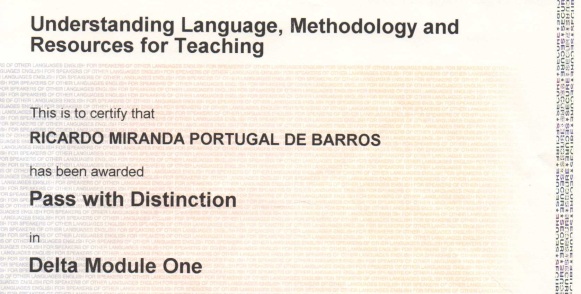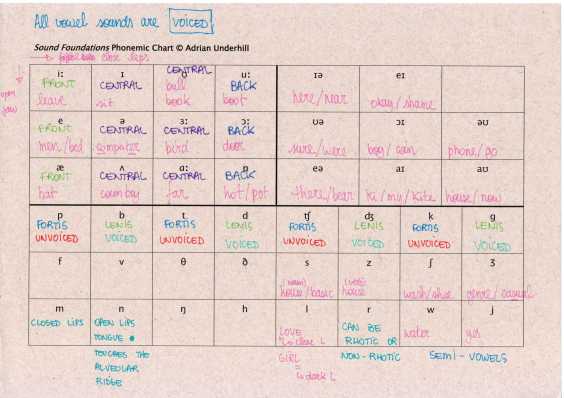Posts about the Delta have been some of the most popular here on the blog and today I’d like to talk about the Module 1 exam. I took it in December 2012 and Passed with distinction. I belive that talking about the way I prepared for the exam may help other people do well, even though there have been some small changes to the format implemented this year.
1. Taking a course or studying on your own?
I took a prep course for Module 1 at Cultura Inglesa São Paulo. I’m the kind of person who needs external motivation to study and I enjoy the social aspect of it as well. If you don’t live near a center, there are online options as well, from the Distance Delta or Bell.
You can decide to study on your own and only sit for the test. If you do that, however, I’d highly recommend finding someone to grade your work. This could be a peer who has taken the Delta or a tutor, but I found really hard grading my own work when I was doing past papers. Apart from Paper 1 tasks 1 and 2, I felt I was both harsh and lenient at times. Having someone else grade your work and point out how you can improve paid off big time for me.
2. Reading
I received a pretty extensive reading list on the first day of the course for Module 1. It can be pretty daunting. What I found out later, however, is that most of those books would only be useful for Modules 2 and 3, but not immediately useful for Module 1.
The most important book I read was About Language, from Scott Thornbury. It helped me understand some key concepts that are tested in Paper 1 Task 5 (which used to be part 4). The chapter on modality is excellent, and I’m sure anyone can learn a thing or two about modal verbs there.
Approaches and Methods in Language teaching was also really useful. It’s like a History lesson in ELT and particularly relevant for those who, like me, grew up during the communicative approach era.
3. Studying
Very early own I identified phonology as an area of weakness, so I decided to put some effort into mastering it. Besides being asked about technical names, you’ll need to use phonetic script throughout the exam.
I started by getting Adrian Underhill’s chart and adding some notes and examples to familiarize myself with the symbols.
I also downloaded Sounds on my mobile and used the practice tool to test myself. The premium version was definitely worth it for me.
Finally, I created a glossary with Delta terminology. Initially it included only features of pronunciation and phonology, but it grew to include many other areas as well – like testing and writing, to name but a few.
Some of the definitions were taken from the TKT glossaray while others came from other books such as the aforementioned Approaches and Methods. You can find a PDF version below:
I later used this glossary to create flashcards on Brainscape, which allowed me to study using my mobile whenever I had some free time.
4. Past Papers
At the time of my exam there were about three years’ worth of past papers available (2 exams per year), and I went through all of them. Besides becoming familiar with the test format, there are more specific things you can get from the past papers.
For example, many of the terms in Paper 1, Tasks 1 and 2 come up again and again so they should give you an idea of what to study or which area is your Achilles’ heel. If you don’t have a breadth of experience with different coursebooks, doing the past papers will expose you to the kinds of books that appear in Paper 2, Task 2.
How you organize your answers is also very important, but I don’t think I could do a better job than Sandy Millin did, so I’ll just link to her blog. Using bullet points and starting each task on a new page helps tremendously both in terms of time and making your answers easy for examiners to find.
Knowing how many points you can get in each task also informed where I started each paper from. You don’t need to start with Task 1 in any given paper and I’d recommend starting with the last tasks. This will allow you to answer them with a fresh mind and go back to them at the end to try to add more information to your answers.
Lastly, as I said earlier, I think it’s very important to have someone else look at your work if you aren’t taking a course.
Thanks for reading


Pingback: Useful links for Delta | Sandy Millin
Pingback: Delta Module 1 with Distinction? Done! | BrELT – Brazil's English Language Teachers
Pingback: Delta Module 1 with Distinction? Done! – Sérgio Pantoja ELT
Thank you so much for this information Ricardo; it is very useful. I have just started a course online for delta module 1. Although I was an English Language Teacher some years ago, I have been out of the industry for a while and feel that my lack of recent ELT experience is going to be a barrier. I struggled to get of to a start with module 1; your terminology is a great help though – were these all of the terms needed to get through the exam?
LikeLike
Hi, Iona. They don’t all appear on the same exam, but there is usually one from each category in paper 1, tasks 1 and 2.
LikeLike
Hi,
Thank you so much for sharing your experience.
Regarding ” about language” , does this book have an answer key?
Since I am self-studying I need valid answers to with which I can check my own answers.
Thaanks 🙂
LikeLike
Hi. Ala. It does have an answer key. What I did was read the chapter, think about answers to the activities and then look at the key.
LikeLike